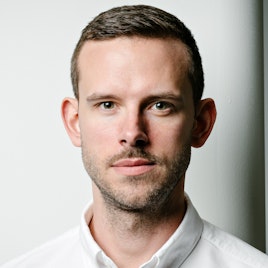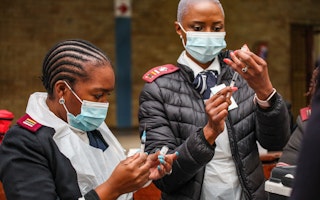A $100 Million Booster for Vaccine Equity
By Sebastian Kohn & Catherine Cax

With global news dominated by Russia’s invasion of Ukraine, it’s easy to forget the other global threat that has killed more than six million people, slashed global economic output by trillions of dollars, and pushed nearly 100 million into poverty.
Another surge of COVID-19 seems inevitable—either from the BA.2 Omicron variant in the near term, or when, inevitably, a new variant emerges. Clearly, much more must be done if the world is going to get the virus under control—and that starts with ensuring that all countries have access to vaccines, not just rich ones.
At the start of the pandemic, Gavi, the Vaccine Alliance, a public-private global health partnership aiming to increase immunity to the virus around the world, identified 92 lower- and lower-middle income countries most in need of assistance. Through its COVAX Advanced Market Commitment (AMC) system, the alliance focused on distributing vaccines funded or donated by countries in the Global North.
In some of those countries, things are on track: By the end of March, Indonesia, India, and Bangladesh were approaching 60 percent vaccination rates. Of the four Latin American countries on the list, El Salvador and Nicaragua have rates over 70 percent and Honduras and Bolivia are on track for getting there by mid-year.
In Africa, regrettably, the situation remains difficult. Forty one Sub-Saharan African countries are covered by the COVAX AMC. But across Africa on average only 15 percent of the population is fully vaccinated, reflecting difficulties in getting access to vaccine supplies as well as the challenges of distribution by underfunded health care systems.
At the same time, the COVAX AMC in Africa has been hamstrung by donor shortcomings. In November 2021, COVAX joined regional health leaders in a joint statement complaining that “the majority of the donations to date have been ad hoc, provided with little notice and short shelf lives. This has made it extremely challenging for countries to plan vaccination campaigns and increase absorptive capacity.”
We must do more to address this immediate crisis by sustainably increasing the predictable flow of vaccines to the countries most in need. That’s why together with the UK’s MedAccess concessionary funding agency and Gavi, Open Society’s Soros Economic Development Fund is providing a $200 million financial guarantee to COVAX that will allow for as many as 190 million additional vaccine dosages to low- and middle-income countries in 2022.
Unlike the COVAX mechanism that distributes donated vaccines to the 92 countries cited above, the guarantee seeks to increase the take-up of a second COVAX mechanism known as the Cost Sharing Mechanism. This works more or less like a discount buying club: by assembling orders from member states, often funded by grants or loans from concessionary lenders like the World Bank or the Asian Development Bank, it secures vaccines at price points up to three times cheaper than would be possible through a bilateral agreement.
This system gives the governments involved more control over what vaccines they order, and when they get them. And the guarantee removes a financial blockage that was slowing down and discouraging governments from using concessionary financing to pay for vaccines. At a time when countries are facing an accelerating debt crisis, it is more important than ever nations can access vaccines at the lowest cost.
The guarantee is just one part of Open Society’s response to the COVID-19 pandemic. When the pandemic broke, we launched emergency funding, investing more than $240 million in the last two years through our global network, supporting a range of responses from providing protective equipment to strengthening public information and awareness about the virus. We are supporters of the People’s Vaccine Alliance, a group of more than 80 organizations around the world calling on governments to make Big Pharma lift patents on life-saving vaccines as part of a broad push for vaccine justice.
And we have invested in efforts to develop new research, development, and manufacturing capacity in the Global South for testing, therapeutics, and vaccines. Working with our philanthropic peers as part of a global alliance of foundations, we are committed to mobilizing resources and voices to ensure the world maintains the necessary momentum to end this pandemic.
More broadly, we have also been speaking out for stronger financial support for indebted nations struggling with the additional burden of COVID, and for new approaches to help countries forced towards defaulting on their debts.
We are proud to play a role in efforts to increase and speed the flow of vaccines to people still at risk, and we remain committed to the global push to learn from the pandemic in order to respond better, and with more justice, to the challenges of an increasingly uncertain future. We need to see that same commitment from world leaders.

Sebastian Kohn is a division director in the Open Society Foundations’ Global Programs.

Catherine Cax is managing director of investments for the Soros Economic Development Fund.
